
History and Highlights
From PBS: The Mississippi Delta is generally considered to be the birthplace of the blues, with the new musical form emerging around the turn of the 19th century. But the story of the blues dates back before the Civil War and to the West coast of Africa where countless men, women and children were captured by slave traders and shipped across the Atlantic for forced labor on Southern plantations.

Slaves from many African countries carried the songs and music of their respective homelands to America. There, amidst the hard work, fear and oppression, the slaves found a temporary escape in music and expressed both hope and despair in their songs. The musical traditions of numerous African cultures blended as the slaves worked side by side in the steamy fields of the south. Field hollers and work songs were a means of expression and communication — which were often not otherwise allowed by the plantation overseers. With few instruments and little or no money, the slaves used their own voices and clapped percussion as musical tools. Their original methods of creating music became significant elements in the creation of the raw Delta Blues style.

As slaves — and then freed slaves — became more integrated into American culture, the church became a regular part of their Sundays. While the white churchgoers sang formal hymns, the black Southerners brought their passionate vocals, clapping, stomping, and call-and-response methods of singing into their own churches. By the 1870s the resulting style of song, called the Negro Spiritual, became an integral part of music in the south and was a major influence in the evolution of the blues.

But it wasn't until 1903, when bandleader W.C. Handy — the self-proclaimed "Father of the Blues" — "discovered" the blues on a train platform in Tutwiler, Mississippi in the unusual guitar licks of a passing traveler. Handy's composition "Memphis Blues", published in 1912, was the first to include "blues" in a song title. Handy's "discovery" and promotion of the new style eventually led to acceptance of the blues as a viable musical form and launched it into the mainstream and beyond black folk culture, forever changing the face of American music.
Dusty juke joints were the main stage for early blues musicians and often the only local source of entertainment for rural blacks. Blues musicians also traveled as part of Vaudeville or Medicine shows and enthusiasm for the blues spread as the shows commanded huge audiences across the south.

The Mississippi Delta was fertile ground for the roots of the blues. With its history of slavery, racial oppression, the Ku Klux Klan, and Jim Crow laws, plus baking heat, rampant illiteracy and poverty, the Delta was a cruel place for many African Americans well into the middle of the 20th century. The blues documented the experience of southern blacks better than any other form of cultural expression.

The songs and music of the early Delta blues were passed down orally, in written form, and later preserved in field recordings made by traveling ethno-musicologists such as the father and son team of John and Alan Lomax in the early 1940s. The earliest blues records were made in the 1920s, but very little recording took place in the Mississippi Delta area. Delta blues musicians like Charley Patton and Skip James headed to northern cities for recording sessions then returned to their homes in the Delta to continue playing juke joints, country dances, and fish fries.

In the 1920s and '30s Delta bluesmen Charley Patton, Son House, and Robert Johnson influenced the next generation of Mississippi born blues greats like Muddy Waters, who took the music north as they joined the mass exodus of blacks from the rural south in the '40s and '50s. The acoustic sound of the Delta blues was amplified and electrified in Memphis and Chicago to accommodate the tastes of the newly urban black population, and, with the growth of its recording industry, Chicago eventually eclipsed the Delta as the center of the blues.

The Delta area has produced the largest number of influential and important blues artists and, though never a major center of the music business, it is still the emotional heart of the blues for musicians, fans, travelers, and historians. (source: PBS)

No comments:
Post a Comment